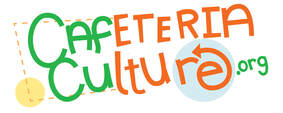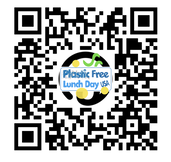NYC Press Release
Plastic Free Lunch Day USA, November 8, 2023
Plastic Free Lunch Day on the menu for urban school districts across the nation
|
For immediate release November 7, 2023 Contact:
|
|
New York, NY, November 8, 2023 - Public school students from across New York City are again at the forefront of the global movement to free school cafeterias from single-use plastics on the third biennial Plastic Free Lunch Day (PFLD) USA November 8, 2023. PFLD, a student call-to-action day, hosted by NYC-based environmental education nonprofit Cafeteria Culture, the force behind the award-winning 2019 movie Microplastic Madness, and the Urban School Food Alliance (USFA), returns this fall, stronger than ever with thousands of new participants across the US and the globe.
Plastic Free Lunch Day is the brainchild of Cafeteria Culture and a group of P.S.15 fifth graders who, after studying plastic pollution for two years, discovered that their lunches contained a shocking amount of single-use plastics. In response, the students designed and carried out the first PFLD and reduced their school lunch waste by 99%, an action that launched the PFLD movement and opened a major institutional pathway to a plastic-free future. School cafeterias, which serve 7.35 billion meals a year (often with 7-10 single-use plastics in each meal), generate billions of once-used plastics, for which there is no effective waste management strategy. As the NYC fifth graders discovered, school and home lunches abound with plastic utensils, straws, plates, pre-packaged food cups, chip bags, and condiment packets. School cafeterias, which serve 7.35 billion meals a year (often with 7-10 single-use plastics in each meal), generate billions of once-used plastics, for which there is no effective waste management strategy. As the NYC fifth graders discovered, school and home lunches abound with plastic utensils, straws, plates, pre-packaged food cups, chip bags, and condiment packets. “Students at P.S.15 Patrick F. Daly Magnet School for the Arts, right here in Brooklyn, started Plastic Free Lunch Day, because they saw that plastics were harming our environment and that the cafeteria could be a catalyst for meaningful change,” said Chris Tricarico, Senior Executive Director of NYC DOE’s Office of Food and Nutrition Services. “It brings us great pride and joy to see our students inspire a national movement to create a more sustainable future.” The Urban School Food Alliance, representing 17 of the largest school districts in the country including NYC, is a school foods and nutrition powerhouse that once again throws its impressive heft behind the movement. “The Urban School Food Alliance is excited to see the momentum behind PFLD and build on the success of the last two years,” said Dr. Katie Wilson, Executive Director of the Urban School Food Alliance. “Our members are committed to creating a healthier future for students and the environment. The ideas and partnerships that come out of our PFLD events are making USFA districts' procurement practices, products, and operations more sustainable. PFLD is a student action response to plastic’s chemical and particle pollution and its effect on climate. The world produces over 400 million metric tons of plastic each year, most of which is throw-away single-use plastics. As described in Cafeteria Culture's Microplastic Madness, plastics break into long-lived tiny pieces, which travel in air, soil and water, and amass in humans and other species, threatening youth and future generations. “Plastic Free Lunch Day is a golden opportunity for New York City and large school systems across the nation to speed the reduction of climate-destroying single-use plastics from school food service,” said Eric Goldstein, NRDC Senior Attorney and Director, NYC Environment, People & Communities Program. “Cutting back on single-use plastics makes sense because it cuts waste disposal costs while reducing health and environmental threats from exposure to plastic’s toxic constituents. And there are no better emissaries than our young students to send the message to government decision-makers that the best time to implement more environmentally sensible policies in our schools is right now.” Students who eat off of plastic foodware or out of plastic packaging are repeatedly exposed to plastic’s toxic chemical constituents, known obesogens, neurotoxins and reproductive toxins. “Besides the known effects of plastics on our planet, children are uniquely vulnerable to the effects of chemicals used in plastic, particularly because of the crucial role of hormones in our bodies for so many biological functions. That’s why this Plastic Free Lunch Day is so important,” said Dr. Leonardo Trasande, MD, MPP, the Jim G. Hendrick MD Professor, Director of the Division of Environmental Pediatrics and Vice Chair for Research in the Department of Pediatrics at NYU School of Medicine. Plastic, which is made from fossil fuels, is a dirty industry with a long-lived toxic and inequitable legacy. The industry hides its heavily-polluting fossil fuel extraction and plastics manufacturing and disposal sites (waste transfer stations, incinerators, and landfills) in urban and rural low income communities and communities of color, subjecting generations to fossil fuel and plastic chemical pollution and resulting acute and chronic disease. These are the same communities that are most vulnerable to extreme weather events caused by plastic-fueled climate change. “As polluting plastics pile up across the world, they wreak havoc on our environment and health, while adding fuel to the Climate Emergency. Plastic Free Lunch Day provides an excellent opportunity for students to take action right in the school cafeteria,” said Debby Lee Cohen, Cafeteria Culture founder and Executive Director. “Students, the clients of school food, are taking real-life relevant action, resulting in game-changing institutional change that tackles the seemingly intractable issues of plastic waste and equity.” Yet, despite plastic’s increasing threat to current and future generations, the plastic industry has doubled production since 2000 and is on target to double again by 2040. Because one plastic free action leads to another, Plastic Free Lunch Day provides an immediate, tangible and repeatable way for students and communities to reclaim a healthy and sustainable future. More information and free QuickStart PFLD resources for educators, students and school food service teams are available on the Cafeteria Culture website: PlasticFreeLunch.org. Students, teachers, and schools everywhere are invited to take part in this exciting day of action. plasticfreelunch.org About Cafeteria Culture Cafeteria Culture (CafCu), founded as Styrofoam Out of Schools, an environmental education 501(c)(3) nonprofit, works creatively with youth to nurture tomorrow’s environmental leaders. CafCu uses innovative education media (science, civics, video production and the arts) to help youth develop place-based solutions to plastic pollution and climate. Students in CafCu’s NYC programs live predominantly in lower income public housing communities and communities of color and provide an urgently-needed environmental equity voice. Among its many accomplishments, CafCu catalyzed the elimination of styrofoam trays from all of NYC’s public schools in 2018, produced the award-winning student-led film Microplastic Madness in 2019, initiated the international Plastic Free Lunch Day movement in 2022 and is currently developing and testing a scalable three-prong school cafeteria solution to plastic and food waste. Learn more about CafCu at www.cafeteriaculture.org. About the Urban School Food Alliance Founded in 2012, the Urban School Food Alliance (USFA) consists of 17 of the nation's largest school districts. Together, its members represent approximately 4.2 million students and serve more than 715 million meals annually. The Alliance was created by school foodservice professionals to address the unique needs of the nation's largest school districts. As a 501(c)(3) nonprofit, the Alliance identifies and shares best practices, crafts standards and policies for healthier school meals, and advocates for the health and wellness of all students. Learn more about the USFA at www.urbanschoolfoodalliance.org. REFERENCES
|
Thank you Urban School Food Alliance districts,
New York City, Dallas, San Diego, Baltimore, Philadelphia,
DeKalb County GA, Portland OR, Chicago, Miami-Dade County
and schools across the US
for joining the 2022-23 school year
Plastic Free Lunch Day USA action!
Map of participants ->
Is your school/school district on board?
Get started with our free resources->
New York City, Dallas, San Diego, Baltimore, Philadelphia,
DeKalb County GA, Portland OR, Chicago, Miami-Dade County
and schools across the US
for joining the 2022-23 school year
Plastic Free Lunch Day USA action!
Map of participants ->
Is your school/school district on board?
Get started with our free resources->



